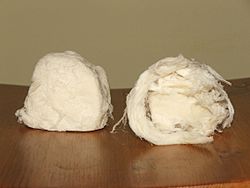Pişmaniye facts for kids
 |
|
| Alternative names | Tel helva, çekme helva, tel tel, tepme helva, keten helva, Ćetenija |
|---|---|
| Type | Dessert |
| Place of origin | Turkey |
| Region or state | Kocaeli, Turkey |
| Main ingredients | Flour, butter, pulled sugar |
Pişmaniye (pronounced PISH-man-yeh) is a unique and delicious sweet treat. It comes from Turkey and Bosnia and Herzegovina. This dessert looks like fine, delicate strands, almost like a fluffy cloud.
To make pişmaniye, cooks mix flour that has been roasted in butter with pulled sugar. Sometimes, it is topped with crushed pistachio nuts for extra flavor. Many people compare pişmaniye to cotton candy. However, the ingredients and the way it is made are quite different.
For a long time, families in many parts of Turkey made pişmaniye at home. This tradition is now becoming less common. Today, machines help with some parts of making this special sweet.
Other Names for Pişmaniye
Pişmaniye has many different names across Turkey. These names often depend on the region where it is made. Some of the most common alternative names include tel helva, çekme helva, tel tel, tepme helva, and keten helva.
Where Did Pişmaniye Come From?
The earliest known mention of pişmaniye in Turkish history is a recipe. It was written by a doctor named Şirvani around the 1430s.
The name pişmaniye comes from a Persian word, pashmak. This word is related to "paşm", which means "wool". So, "Pashmak" means "wool-like". An Iranian poet named Ebu Ishak, who lived in the 1400s, used the word "pashmak" in his poems.
Another idea about its origin suggests it might come from an old Egyptian language called Coptic. In Coptic, "pis" means "to mix flour with fat". "Nani" or "mani" means "honey". In Egypt, there is a similar candy called "halawat sha'ar", which means "hair candy".
See also
 In Spanish: Pişmaniye para niños
In Spanish: Pişmaniye para niños
 | Toni Morrison |
 | Barack Obama |
 | Martin Luther King Jr. |
 | Ralph Bunche |

